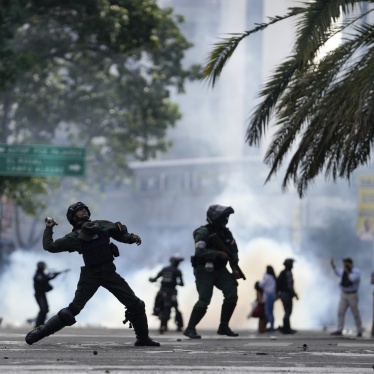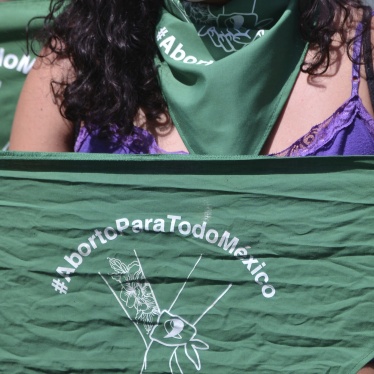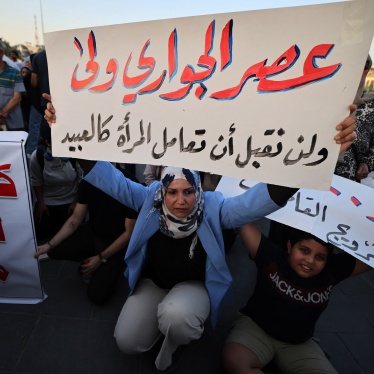Federica Mogherini
High Representative of the Union for Foreign Affairs and Security Policy /
Vice-President of the European Commission
Rue de la Loi / Wetstraat 200
1049 Brussels
Brussels, 11 September 2017
Re: Call for EU action in response to rights abuses in Venezuela
Dear High Representative/Vice-President Federica Mogherini,
We are writing on behalf of Human Rights Watch to urge you to lead an European Union effort to significantly advance pressure on the Venezuelan government to address the profound human rights and humanitarian crisis in that country.
In Venezuela today, there are no independent institutions left to act as a check on executive power. The government is repressing dissent through a brutal crackdown on the streets, jailing opponents, and prosecuting civilians in military courts. Due to severe shortages of medicines, medical supplies, and food, many Venezuelans cannot adequately feed their families or access the most basic healthcare. In response to the human rights and humanitarian crisis, hundreds of thousands of Venezuelans are fleeing the country.[1]
Human Rights Watch welcomes recent statements by the European Union expressing concern about the abuses being committed in Venezuela, and the Maduro government’s attempts to usurp powers of the legislature and undermine the rule of law.[2] These statements come at a time when key governments have placed Venezuela at the top of their regional priorities, most recently by the adoption by 12 governments—those of 11 Latin American countries and Canada—of the comprehensive Lima Declaration, which outlines key issues of concern.[3]
As the crisis worsens, we urge the European Union and its member states to agree on a strategic roadmap of positive incentives and targeted punitive measures to advance collective EU pressure on the Venezuelan government. Such a strategic and collective EU effort should, in our view, include the urgent adoption of strong and principled Foreign Affairs Council conclusions, and statements of concern by the EU and its member states in international fora such as the United Nations’ Human Rights Council and General Assembly. The EU should make clear that, in face of continued stonewalling by the Maduro government, it stands ready to impose targeted punitive measures against Venezuelan officials who bear responsibility for continued egregious human rights abuses. We also urge the EU to seek ways to increase humanitarian assistance to help alleviate the devastating food and health crisis in Venezuela.
Concentration of Power
The absolute concentration of power in Venezuela has allowed the Maduro regime to commit a range of serious abuses without facing any internal checks. Since the political take-over of the Supreme Court by former President Hugo Chávez and his allies in the National Assembly in 2004, the judiciary has stopped acting as an independent branch of government. Since the opposition majority took over the National Assembly in January 2016, the Supreme Court has stripped the legislature of its most basic powers. The government also controls the National Electoral Council, which effectively stalled a recall referendum on President Maduro’s presidency in 2016 and failed to conduct elections for governors, which the Constitution mandated for 2016.
In August 2017, the Venezuelan government moved forward with the implementation of a Constituent Assembly that was convened in May this year through a presidential decree, despite a constitutional requirement that prior popular consultation is needed. It is made up exclusively by government supporters, which were chosen through an election on July 30 that the company hired by the government to verify the results later said was fraudulent.
The Constituent Assembly has frighteningly broad powers that go well beyond drafting a constitution. In fact, the Constituent Assembly’s first measure was to fire the attorney general, a former government loyalist who became an outspoken critic in late March. It then appointed a government loyalist to the position, and subsequently took over legislative powers from the National Assembly. At the moment, the Constituent Assembly is debating the adoption of a “law against political violence” that would sentence people who “convoke violent actions and generate chaos and anxiety in the population” to up to 25 years in prison, and called for the implementation of a “historic trial” of opponents it accused of “treason” for allegedly supporting international sanctions against the regime.
Repression of Dissent
Venezuelan security forces, together with armed pro-government groups called “colectivos,” have brutally cracked down on massive anti-government protests since people took to the streets in early April. They have shot demonstrators at point-blank range with riot-control munitions, run over demonstrators with an armored vehicle, brutally beaten people who offered no resistance, broken into homes of suspected opponents, and attacked whole residential areas, buildings, and clinics. Security forces and armed pro-government groups have broken into residential areas after protests, destroying doors and cars, stealing, and beating and detaining residents. On July 5, armed pro-government groups attacked the National Assembly building and injured legislators, in collaboration with members of the National Guard.
According to the Attorney General’s Office, over 120 people have been killed during incidents related to the protests. In late July, before Attorney General Luisa Ortega Díaz was removed from office, in more than half of the nearly 2,000 investigations into injuries during the protests the office was investigating violations of fundamental rights. Unofficial statistics put the death toll and number of people injured much higher.
Approximately 5,300 people have been arrested in the context of the demonstrations, including demonstrators, bystanders, and people taken away from their homes without warrants, according to the Venezuelan Penal Forum, a local NGO that provides legal support to detainees nationwide. Around 1,000 remain behind bars. Human Rights Watch has documented allegations of serious abuses against detainees that in some cases would amount to torture—including severe beatings, electric shocks, and forcing detainees to eat excrement. More than 700 civilians have been prosecuted by military courts, in violation of both Venezuelan and international law.
The Venezuelan government has jailed political opponents, and disqualified them from running for office. There are more than 640 political prisoners in Venezuela, according to the Venezuelan Penal Forum. In recent weeks, the Supreme Court has arbitrarily sentenced five mayors, after summary proceedings that violate due process, to 15 months in prison and has disqualified them from running for office. At least nine more are subject to a Supreme Court injunction that could lead to sanctions following the same procedure.
The UN High Commissioner for Human Rights released a report in late August, concluding that extensive human rights violations and abuses have been committed in the context of anti-Government protests in Venezuela and point to “the existence of a policy to repress political dissent and instill fear in the population to curb demonstrations.” According to the report, the “generalized and systematic use of excessive force during demonstrations and the arbitrary detention of protestors and perceived political opponents indicate that these were not the illegal or rogue acts of isolated officials.” It also stated that some detentions may have constituted enforced disappearances, in those cases in which authorities refused to acknowledge, for an initial period of time, the fate or whereabouts of the detainees. In addition, the report concluded that more than half of the deaths that occurred in the context of demonstrations had been caused by security agents or colectivos, and four people died after attacks by anti-government groups. The government claims nine security agents were killed.[4]
The Humanitarian Crisis
Venezuelans are facing severe shortages of medicine, medical supplies, and food that is seriously undermining their rights to health and food.[5] In 2017, the Venezuelan health minister released official data for 2016 indicating that, in one year, maternal mortality increased 65 percent, infant mortality increased 30 percent, and cases of malaria increased 76 percent.[6] Days later, the minister was fired. Cases of severe malnutrition of children under 5 years old increased from 8.9 percent in the last trimester of 2016 to 10.2 percent in the first two months of 2017—putting Venezuela above the World Health Organization limit of what constitutes a crisis, according to Cáritas Venezuela.[7]
The Venezuelan government continues to deny the humanitarian crisis exists.[8] Consequently, readily available international humanitarian aid that would alleviate the suffering of many Venezuelans who struggle to adequately feed their families and have access to the most basic healthcare is not reaching the Venezuelan people.
Measures that Should be Adopted
To address Venezuela’s human rights and humanitarian crisis, Human Rights Watch is calling on governments world-wide and international bodies to send a clear message to the Venezuelan government that these clear violations of international law and the continued crackdown on rights and democratic institutions will come at a price, and that those responsible of grave abuses must eventually be brought to justice.
In conclusion, we urge you to place Venezuela on the agenda of the upcoming Foreign Affairs Council and pave the way for a collective European Union policy roadmap to increase urgently needed pressure on the Maduro administration to end the repression, release all political prisoners, set a date for free and fair elections with proper independent oversight, restore judicial independence and the powers of the National Assembly, and immediately allow sufficient international humanitarian aid into the country. The EU should make clear that it stands ready to:
- Adopt targeted punitive measures against Venezuelan officials deemed responsible for continued and egregious human rights violations, including the head of the Bolivarian National Guard, the defense minister (to whom the head of the Bolivarian National Guard reports), the head of the Bolivarian National Police, the interior and justice minister (to whom the Bolivarian National Police reports), the head of the Bolivarian National Intelligence Services, and the military attorney general.[9]
- Offer the Venezuelan government humanitarian aid that would help alleviate the severe shortages of medicines, medical supplies, and food. In addition to supporting the work of non-governmental groups that receive donations and distribute food or medicines in the country—and can only provide limited and temporary support to Venezuelans whose rights to health and food are being undermined— the EU should offer state institutions additional humanitarian assistance earmarked for healthcare and social services benefiting people in need of help and care.
- Express serious concern about the quickly deteriorating human rights and humanitarian crisis in Venezuela through strong and principled Foreign Affairs Council conclusions and EU statements in United Nations’ Human Rights Council and General Assembly.
Please do not hesitate to contact us if you need further information on Venezuela.
Sincerely,
Lotte Leicht
EU Director
Human Rights Watch
José Miguel Vivanco
Executive Director, Americas Division
Human Rights Watch
CC:
Head of Cabinet of the High Representative of the Union for Foreign Affairs and Security Policy / Vice-President of the Commission, Ms Fabrizia Panzetti
Secretary General of the European External Action Service (EEAS), Ms Helga Schmid
Deputy Secretary General for political affairs, Political Director, EEAS, Mr Jean-Christophe Belliard
Deputy Secretary General for economic and global issues, EEAS, Mr Christian Leffler
Deputy Secretary General for CSDP and crisis response, EEAS, Mr Pedro Serrano
Chair of the EU’s Political and Security Committee, Amb. Walter Stevens
EU Special Representative for Human Rights, Mr Stavros Lambrinidis
Head of the Delegation of the European Union to Venezuela, Amb. Aude Maio-Coliche
Managing Director for the Americas, EEAS, Ms Edita Hrda
Director, Deputy Managing Director for the Americas, EEAS, Mr Richard Tibbels
Head of Division for South America, EEAS, Mr Adrianus Koetsenruijter
Managing Director for Human Rights, Global and Multilateral Issues, EEAS, Ms Lotte Knudsen
Director, Deputy Managing Director for Human Rights, Global and Multilateral Issues, EEAS, Mr Marc Giacomini
Head of Division for Human Rights, EEAS, Ms Mercedes Garcia-Perez
Director for the Security Policy, EEAS, Mr Pawel Herczynski
Acting Chair of the EU’s Working Party on Latin America and the Caribbean (COLAC), Mr Manfredo Fanti
Chair of the EU’s Working Party on Human Rights (COHOM), Ms Ciara O’ Brien
President of the European Parliament, Mr Antonio Tajani
Vice-President of the European Parliament responsible for Democracy and Human Rights, Mr Alexander Graf Lambsdorff
Chair of the European Parliament’s Foreign Affairs Committee, Mr David McAllister
Chair of the European Parliament’s Subcommittee on Human Rights, Mr Pier Antonio Panzeri
Chair of the European Parliament’s Delegation to the Euro-Latin American Parliamentary Assembly, Mr Ramón Jáuregui Atondo
Chair of the European Parliament’s Delegation for relations with Mercosur, Mr Francisco Assis
[1] For additional Human Rights Watch reporting on Venezuela, please visit our Venezuela’s crisis blog, available at: https://www.hrw.org/blog-feed/venezuelas-crisis . Unless noted otherwise, the sources for information included in this letter are available at the blog.
[2] For example, “Declaration of the High Representative Federica Mogherini on behalf of the EU on the situation in Venezuela ahead of the election of the Constituent Assembly on 30 July 2017,” July 26, 2017, http://www.consilium.europa.eu/en/press/press-releases/2017/07/26-hrvp-declaration-situation-venezuela/ (accessed September 1, 2017).
[3] Lima Declaration, August 8, 2017, http://www.international.gc.ca/oas-oea/2017-08-Lima_Declaration.aspx?lang=eng (accessed September 1, 2017).
[4] “Venezuela: Human Rights Violations Indicate policy to repress,” http://www.ohchr.org/EN/NewsEvents/Pages/DisplayNews.aspx?NewsID=22007&LangID=E (accessed September 8, 2017).
[5] Human Rights Watch, “Venezuela’s Humanitarian Crisis: Severe Medical and Food Shortages, Inadequate and Repressive Government Response,” October 2016, https://www.hrw.org/report/2016/10/24/venezuelas-humanitarian-crisis/severe-medical-and-food-shortages-inadequate-and.
[6] “Official Data on Health Crisis,” https://www.hrw.org/content/303527.
[7] “Cáritas on Children’s Malnutrition,” https://www.hrw.org/content/304349 .
[8] See for example, Video: Delcy Rodríguez: In Venezuela there is no humanitarian crisis (Delcy Rodríguez: En Venezuela no hay crisis humanitaria), June 20, 2017, http://www.el-nacional.com/videos/gobierno/delcy-rodriguez-venezuela-hay-crisis-humanitaria_35212 (accessed September 1, 2017); Video: Delcy Rodríguez: “In Venezuela there is no hunger nor humanitarian crisis” (Delcy Rodríguez: “En Venezuela no hay hambre ni crisis humanitaria”), August 4, 2017), http://800noticias.com/video-delcy-rodriguez-en-venezuela-no-hay-hambre-ni-crisis-humanitaria (accessed September 1, 2017).
[9] See Human Rights Watch, “Venezuela: Senior Official’s Responsibility for Abuses,” June 15, 2017. The military attorney general has been replaced since then by the General Edgar Rojas Borges, http://www.mindefensa.gob.ve/mindefensa/2017/06/26/el-gb-edgar-rojas-borges-asume-la-fiscalia-general-militar-de-la-fanb/ (accessed September 1, 2017).








